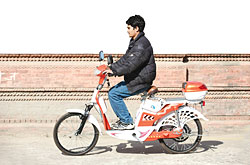 ANUP PRAKASH |
The battery-powered bicycle, also called e-bike, cuts a lonely and ungainly figure in Kathmandu streets where it is easily overtaken and often mocked. The bike could, however, revolutionise urban transportation in Nepal.
So far the e-bike has fallen short of its potential because its
price is inflated by duties and scarcity. Powered by a 48 volt, lead-acid or lithium battery and if charged for 8 hours, the bike can travel up to 50 km at a maximum speed of 40 kmph. They can also be pedaled manually.
The batteries don't emit greenhouse gases but the lead-acid variety is hard to dispose of without damaging the environment. At about 30 kg the bicycles have a heftier, alloy-aluminum frame than regular bicycles and scooter-like headlights, although some models are light enough to be folded into car trunks.
Sales of Chinese and Indian e-bikes have gotten off to a slow start since their arrival in Nepal in 2007, with only five companies selling 500 bikes in Kathmandu. That figure is miniscule when compared to the 65 million that dart through roads in China.
The buyers also represent a wealthier demographic in Nepal than they do elsewhere where the e-bike has caught on among middle-class professionals.
"Our main customers are women and environmentally-conscious people, many from international organisations", says Sanjay Shrestha of Shree Eco Vehicles.
At between Rs 30,000-40,000 they are far too expensive for commuters they could help most: people living in the Valley rim who commute to work in the city like electrician Pramod Tamang, 42. He lives in the hills beyond Budhanilkantha and was enthusiastic about the e-bike but dismayed by the price.
Management expert Ashok Pandey of National Electric Vehicle Industries says, "There is a big market for bikes in villages on the outskirts of Kathmandu and in the Tarai".
E-bikes are expensive in Nepal because they are scarce, use pricey, green technology and are mostly imported. Although the import duty has been halved, it still stands at 20 per cent since the government classifies e-bikes as motorbikes which have a higher duty than regular bikes. Indian authorities alert to their social potential have subsidised e-bikes by $150 making them as affordable as regular bicycles.
In Japan e-vehicles (EV) are 50 per cent cheaper than identical gas driven vehicles because of a government subsidy. Although the Nepal government has waived VAT duties on batteries and kept import duties on EV accessories low, they've left some market hurdles undisturbed.
Likewise, e-car companies have long campaigned for reduced duties but have been repeatedly outdone by gasoline-powered car lobbies. Experts believe prices will come down once the supply of electric vehicles and their parts increase, but this will take time.
E-scooters cost Rs 60,000-110,000 and have been doing poorly in large part because people aren't aware that they make economical and environmental sense since it costs a mere Rs 10 to charge a 60V battery that can last up to 60 km.
Prices could decrease further if e-bikes were manufactured locally, but a plant manufacturing electric bicycles would cost up to Rs 500 million and may not yet be viable.
Rabindra Sharma of Himalayan Power Solutions thinks joint-ventures with companies abroad is the way to go. "If we get support from foreign companies, we can have a plant up and running soon."
Local companies could also try marketing a more rudimentary e-bike by attaching batteries to regular bicycles. Pandey thinks a similar strategy could vastly diminish the price of e-cars.
"If we simply converted regular cars to e-cars, their price could fall from Rs500,000 to just Rs150,000-160,000."


